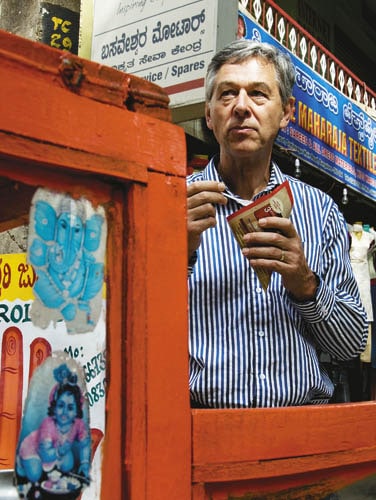
"In India, I find that people tend to please people too much"
Alexius Collette tries to change the way Indians work at the Bangalore office
Four years ago I was working at the Philips Shavers in Holland when one fine day I got a call from our CTO Mr Huijser to ask if I wanted to run the innovation campus in Bangalore. I took five minutes to say yes. My wife Matty said ‘go for it’. It’s very important that your family should be comfortable with living in different places too.
We moved to Bangalore in January 2006 and the first thing we decided was that we will not live in a gated community with other expats. We have chosen to live in an Indian neighbourhood. I think that it is the best way to learn about a country and really enjoy it.
In the last 33 years I have worked all over the world (Asia and Europe) in various business units and functions with Philips. I have found that people who work in so many different places and countries ‘hang above the earth’, by that I mean they have a much broader view which is so different from a person who has spent his entire working life in one environment.
Today I work at an innovation hub which is connected to various R&D centers around the world. The Philips Innovation Centre in Bangalore is a very important place for us. This centre creates software which is integrated into hardware products in Healthcare and Consumer Lifestyle; these sectors generate over 60 percent of Philips’ revenue.
Wherever you work — Singapore, Netherlands, Belgium or Bangalore — the business is similar but values are different. It’s like an onion — at the centre it’s the same but around it, it’s different. Even though I had met and worked with Indians before, settling here was different. You think you know but then you come here, you better start from scratch. The picture I had faded; people change, cultures change, and if you take the culture of the IT crowd, it’s completely different. This is why it is important that you first spend some time understanding the people and culture before promising to change anything.
The Dutch are very direct people, we tell it as it is. We constantly challenge our elders and bosses. Indians are more respectful, they will constantly evaluate the position when they meet someone. It’s also a very vertical society, so they are very conscious of not challenging their superiors and elders. At the same time I experience a lot of openness and warmth. By giving the right stimuli and creating an atmosphere of trust I see them developing another working style: Saying what they think, challenging the status quo or the boss, creative thinking.
Here in India, I find that people tend to please people too much. If you ask someone when this will be done, they will say next weekend without really knowing how much time it will really take them. They will just say weekend because they want to please their superior. I will advise them to think it over. It’s OK to say that they will take more time and commit to this — what is not OK is that they say a week and then take three weeks.
The other thing that I feel is that young people here do not like taking risks and come forward with crazy, new ideas. It may be related to the education system, which is in my view too much about memorising and to the values even at home, where it is not about the individual identity which is less important than the family. We are an innovation centre so you have to think from the customer’s point — what does he want and you have to be able to go beyond and innovate. When mistakes are made, people tend to cover up for them, but we encourage them to own it upfront and use them for learning. When I do our Philips value workshop I try to bring about the change — we tell them it’s OK to own up to mistakes and learn from failure. Again, it is all about trust.
I find it fascinating that Indians also live in a very different way inside and outside the house. Inside the house it’s all very organised — there is a tight structure. But give them a bike and put them on the road and they transform. They kick and push and drive all over the road. There is still a lot of unlocked value which can strengthen the R&D capabilities in India. And we will need this for continents like US and Europe where the population is decreasing and interest in science and technology is relatively decreasing.
Outside the office I love my squash game and I am hooked to yoga after Matty convinced me to try it (she started more than 10 years ago). India is like a melting pot of different cultures. When trekking in the rural areas, people are always proud and really show interest in you. Last time we went for a Kerala dance performance with swords at a small place opposite the City Hall. It was raining so heavily that we had to take off our shoes and walk. We were the only white people there, we enjoyed it so much. We also love to eat Indian cuisine and we can handle the spices really well thanks to our Singapore days. We eat at small dhabas too, that is the best way to taste the local food.
(As told to Mitu Jayashankar and Nilofer D’Souza)
(This story appears in the 30 November, -0001 issue of Forbes India. To visit our Archives, click here.)





